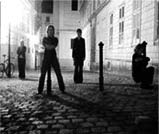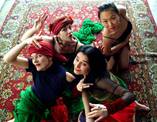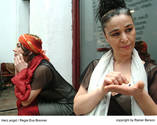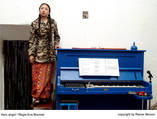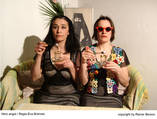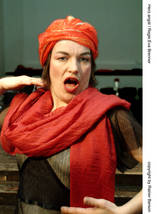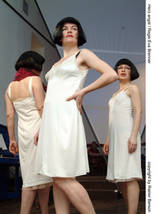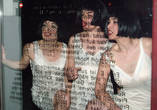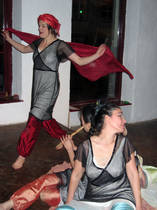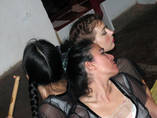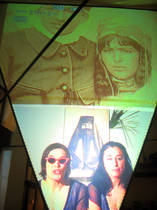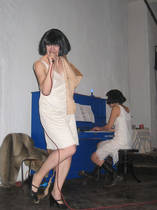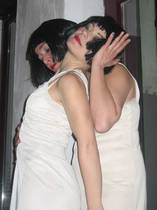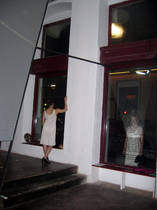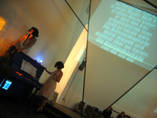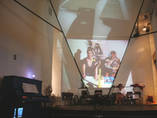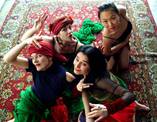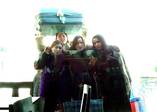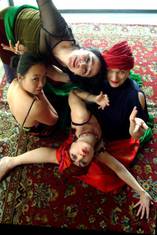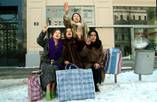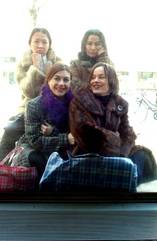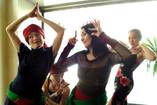Performance with Prosetexts by Else Lasker-Schüler
& Marlene Streeruwitz
World Premiere: Thursday, 7th of April 2005, 8 pm
Performances: 8th-10th, 12th-16th, 19th-23th of April., 8 pm
Audience Discussion after each performance
A theatralical Play around „Foreigness“ and “Belonging”
As part of the Cycle "NICE TO MEAT YOU!, Scenes from the Age of TERROR & COOLNESS, Interdisciplinary Theater- and Research Project
Mise-en-scène:
Eva Brenner (A/USA)
Assistance:
Isabel Öhlinger (A)
Space Design/Light/Videoprojection:
Andreas Pamperl (A)
Music Installation:
Konstantin Anthanasiadis (A)
Dramaturgy/Production Management: Andreas Kövary (A)
Dramaturgical Assistance:
Anna Sonntag (A)
Costume Design:
Beatrice Radlinger (A)
Fotography/Graphics:
Rainer Berson (D)
Webdesign/typo3 CMS:
Alexander Schlögl (A)
Conceptual & dramaturgical Research on Else Lasker-Schüler:
Sylke Kirschnick (D)
Press & Public relations:
ANZELINI’S BÜRO, 0699-13224663, monika(at)anzelini.at
Performance:
Emel Heinreich (A/TR), Birgit C. Krammer (CH), Maren Rahmann (D), YAP Sun Sun (SING)
The new artistic team of PROJEKT THEATER STUDIO has created the performanceprojekt „HEART.fear“ for ist newly opened space BUTCHERY on the basis of early „orientalizing“ prose texts of Else Lasker-Schüler (1869-1945) and a new text by contemporary Austrian author, Marlene Streeruwitz. Both texts are set into contrasting relationship by an intercultural ensemble. In the center stands the cultural split of women and artists who feel homeless in two worlds: in the space of their „exile“ and „as well in their own culture where they come from – an existential foreigness resulting in feelings of loss of identity. They share this dilemma in differing ways with artists such as Else Lasker-Schüler, - the German Jew in the Berlin of the 20s and 30s – or with such contemporary writers such as Marlene Streeruwitz.
The Performance: Two Texts – four actresses
In the Performance four actresses from Eastern and Western cultures are searching for the meaning of the „Orient“ – which at least since „9/11“ and within the setting of the „bullwark Europa“ has for ever lost its fairy-tale quality – as well as the equally exotic notion of the “Occident“. They are “aliens” in three ways: they are questioning their existence as women, as artists, and as foreigners living in Austria. Critical texts by Marlene Streeruwitz break the theatrical play and circumscribe the topic of cultural „belonging“ from the perspective of women today. Thus a panorama spanning one century is unfolding in the “empty” theater space of the BUTCHERY. The discourse is continued into the public space in front of the large shop-windows of the BUTCHERY.
Excerpts from Lasker-Schüler’s letter-novel „My Heart“ (1912) as well as fragments of her orientalizing prose stand in contrast to the melancholy of her late poem „My Blue Piano“, written in 1943 shortly before her death in Jerusalem. The mesmerizing play of Else Lasker-Schüler is mirrored in the personal stories of the four „women in motion“ around real and fictitious agencies of cultural „belonging“. The dark despair of the poem „My Blue Piano“ meets the utopian calling of a militant contemporary artist.
Thereby the image of what is “alien” and what belongs to “home” is virtually deconstructed and as well the image which foreigners have forged about people of the Western hemisphere. Being and appearance converge – the “exotic” is revealed as „false“.
Music
The music was composed by the Austrian musician Konstantin Athanasiadis, who places a blue piano as a central anchor point in the space and prepares it with samples of „oriental “ songs and sounds from different cultures.
Audience Interaction
Spectators can interactively participate in the performance: they are invited to white personal texts on the topic of „Orient“ and „Foreigness – Belonging“ on the theater’s homepage and receive free tickets to the show. One text will be selected each night and will be improvised on live by the acting ensemble. Thus each evening of performance takes on a different gestalt.
Marlene Steeruwitz, noted contemporary Austrian novelist and playwright, approaches the topic from the point of view of women and artists today and inscribes her literary theory as a “text of resistance” into the performance – with her specific contemporary knowledge of the fate of a German-Jewish writer such as Else Lasker-Schüler who was ripped off her homeland by the Nazis. She shows us a Europe as curious “market of flesh” mixed of advertising, tourism and consumption eager to ameliorate and manage our dealing with “Foreigness” – while at the same time global alienation is rapidly growing.
Else Lasker-Schüler (1869-1945): the renowned German Avantgardist, playwright and poet lived from 1894 to 1933 in Berlin und was forced to emigrate to Zürich in 1933. Since 1939 she lived in Jerusalem where– already famous within in art circles – she died lonely and poor. In her prose “orientalisms” count as prominent formal qualities and all-encompassing strategies of literary alienation methods. Under changing masks and set before the backdrop of growing fascism the poet topicalizes her yearning for a phantastic „Arabia“ and „Hebrew Land“. Even as a private person she preferred to stage herself as an „oriental artists“. Within a self-involved play of exotic costumes she ironized and confused her contemporaries as „Jussuf, Prince of Thebes“. This figure opens a vast space of associative play grounds in which exotic rituals permeate and relativize the role of art and artists, of utopia and cultural identity. In 1932 she received the Kleist-Preis for her life’s work.
